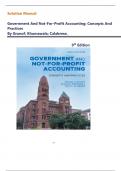Solution Manual
Government And Not-For-Profit Accounting: Concepts And
Practices
By Granof; Khumawala; Calabrese,
9th Edition
1-1
,Solution Manual For Government And Not For
Profit Accounting Concepts And Practices
9th Edition Michael H. Granof
Chapter 1
The Government And Not-For-Profit Environment
Questions For Review And Discussion
1. The Critical Distinction Between For-Profit Businesses And Not-For-Profits Including
Governments Is That Businesses Have Profit As Their Main Motive Whereas The Others
Have Service. A Primary Purpose Of Financial Reporting Is To Report On An
Entity‘S Accomplishments — How Well It Achieved Its Objectives. Accordingly,
The Financial Statements Of Businesses Measure Profitability, Their Key
Objective. Financial Reports Of Governments And Other Not-For-Profits Should
Not Focus On Profitability, Since It Is Not A Relevant Objective. Ideally,
Therefore, They Should Focus On Other Performance Objectives, Such As How
Well The Organizations Met Their Service Goals. In Reality, However, The Goal
Of Reporting On How Well They Have Achieved Such Goals Has Proven Difficult
To Attain And The Financial Reports Have Focused Mainly On Financially- Related
Data.
2. Governments And Not-For-Profits Are ―Governed‖ By The Budget, Whereas
Businesses Are Governed By The Marketplace. The Budget Is The Key Political
And Fiscal Document Of Governments And Not-For-Profits. It Determines How An
Entity Obtains Its Resources And How It Allocates Them. It Encapsulates Most
Key Decisions Of Consequence Made By The Organization. In A Government The
Budget Is Not Merely A Managerial Document; It Is The Law.
3. Owing To The Significance Of The Budget, Constituents Want Assurance That The
Entity Achieves Its Revenue Estimates And Complies With Its Spending Mandates.
They Expect The Financial Statements To Report On How The Budget Was
Administered.
4. Interperiod Equity Is The Concept That Taxpayers Of Today Pay For The Services
That They Receive And Not Shift The Payment Burden To Taxpayers Of The
Future. Financial Reporting Must Indicate The Extent To Which Interperiod Equity
Has Been Achieved. Therefore, It Must Determine And Report Upon The
Economic Costs Of The Services Performed (Not Merely The Cash Costs) And Of
The Taxpayers‘ Contribution Toward Covering Those Costs.
5. The Matching Concept May Be Less Relevant For Governments And Not-For-
Profits Than For Businesses Because There May Be No Connection Between
2-2
, Revenues Generated And
The Quantity, Quality Or Cost Of Services Performed. An Increase In The Demand
For, Or Cost Of, Services Provided By A Homeless Shelter Would Not Necessarily
Result In An Increase In The Amount Of Donations That It Receives. Of Course,
Governments And Not- For-Profits Are Concerned With Measuring Interperiod
Equity And For That Purpose The Matching Concept May Be Very Relevant.
6. Governments Must Maintain An Accounting System That Assures That Restricted
Resources Are Not Inadvertently Expended For Inappropriate Purposes. Moreover,
Statement Users May Need Separate Information On The Restricted Resources By
Category Of Restriction And The Unrestricted Resources. In Practice, These
Requirements Have Led Governments To Adopt A System Of ―Fund‖ Accounting
And Reporting.
7. Even Governments Within The Same Category May Engage In Different Types Of
Activities. For Example, Some Cities Operate A School System Whereas Others
Do Not. Those That Are Not Within The Same Category May Have Relatively
Little In Common. For Example, A State Government Shares Few Characteristics
With A City.
8. If A Government Has The Power To Tax, Then It Has Command Over, And
Access To, Resources. Therefore, Its Fiscal Well-Being Cannot Be Assessed
Merely By Measuring The Assets That It ―Owns.‖ For Example, The Fiscal
Condition Of A City Should Incorporate The Wealth Of The Residents And
Businesses Within The City, Their Earning Capacity, And The City‘S Willingness
To Exploit Its Tax Base.
9. Many Governments Budget On A Cash Or Near-Cash Basis. However, The Cash
Basis Of Accounting Does Not Provide Adequate Information With Which To
Assess Interperiod Equity. Financial Statements That Satisfy The Objective Of
Reporting On Interperiod Equity May Not Satisfy That Of Reporting On Budgetary
Compliance. Moreover, Statements That Report On Either Interperiod Equity Or
Budgetary Compliance Are Unlikely To Provide Sufficient Information With
Which To Assess Service Efforts And Accomplishments.
10. Measures Of Service Efforts And Accomplishments Are More Significant In
Governments And Not-For-Profits Because Their Objectives Are To Provide
Service. By Contrast, The Objective Of Businesses Is To Earn A Profit. Therefore,
Businesses Can Report On Their Accomplishments By Reporting On Their
Profitability. Governments And Not-For-Profits Must Report On Other Measures
Of Accomplishment.
11. The Fasb Influences Generally Accepted Accounting Principles Of Governments In
Two Key Ways. First, Fasb Pronouncements Are Included In The Gasb ―Hierarchy‖
Of Gaap. Fasb Pronouncements That The Gasb Has Specifically Made Applicable
To Governments Are Included In The Highest Category; Those That The Gasb Has
Not Specifically Adopted Are Included In The Lowest Category. Second, The
Business-Type Activities Of Governments Are Required (With A Few Exceptions)
3-3
, To Follow The Business Accounting Principles As Set Forth By The Fasb.
12. It Is More Difficult To Distinguish Between Internal And External Users In
Governments Than In Businesses Because Constituents, Such As Taxpayers, May
Play Significant Roles In Establishing Policies That Are Often Considered Within
The Realm Of Managers. Also, Legislators Are Internal To The Extent They Set
Policy, But External Insofar As The Executive Branch Must Account To The
Legislative Branch.
Exercises
Ex 1-1
1. A
2. C
3. C
4. C
5. B
6. C
7. D
8. C
9. B
10. C
Ex 1-2
1. B
2. B
3. D
4. B
5. A
6. C
7. A
8. B
9. A
10. B
Ex 1-3
a. 1. The Governmental Accounting Standards Board (Gasb) Is The Independent
Organization That Establishes And Improves Standards Of Accounting And Financial
Reporting For U.S. State And Local Governments. Established In 1984 By Agreement
Of The Financial Accounting Foundation (Faf) And 10 National Associations Of State
And Local Government Officials, The Gasb Is Recognized By Governments, The
Accounting Industry, And The Capital Markets As The Official Source Of Generally
4-4




